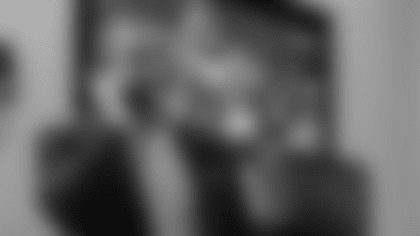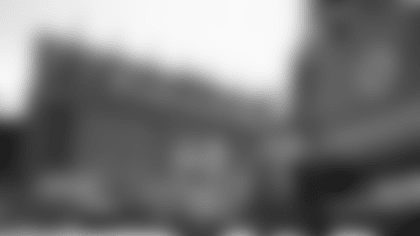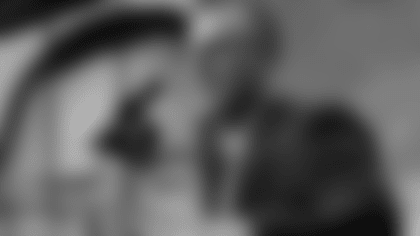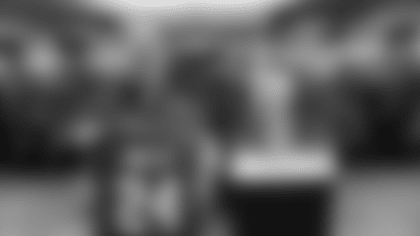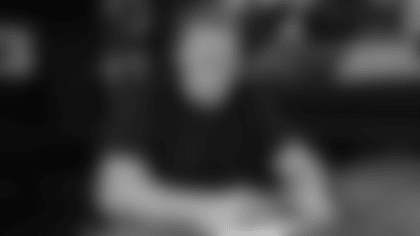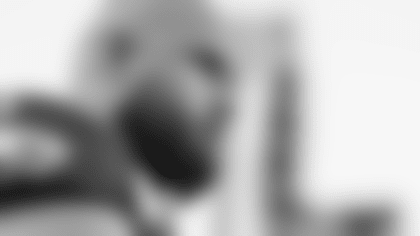The global pandemic served as a wake-up call to many Americans due to the various inequalities in society ranging from education, workforce development, poverty, and community and police relations. On Wednesday, the Eagles – as a team – acknowledged the work non-profit organizations have done at the grassroots level for several years. The Eagles announced that the Eagles Social Justice Fund of the Philadelphia Foundation awarded grants totaling $460,000 to 24 Philadelphia-area non-profit organizations.
The Eagles Social Justice Leadership Council, which is comprised of a small collection of players and club executives, works to identify potential grant recipients and secure contributions to the Eagles Social Justice Fund. The Fund is built through one-to-one matching donations from players and the club. Players on the council include Jake Elliott, Zach Ertz, Brandon Graham, DeSean Jackson, Malik Jackson, Rodney McLeod, Darius Slay, and Carson Wentz.
McLeod, who has been on the council since it was established in 2018, was proud of the discussions with the entire team that resulted in the distribution of the grant money.
"I think one thing that we always try to do is listen – not only our board members and what we feel is best for the time, but also listen to the team. We felt education was important because of the climate. Health care was important due to COVID. We know that there is a disparity that exists in education. That's all been at the top of our list along with finding a way to support black-owned businesses. Voting was also on there as we approached this past election. I think workforce development has always been big for us. Police reform was big as well," McLeod said.
"We put that all together and brought it to the team and honestly allowed them to be our voice for us. How is it best that we spend our money? From there, we looked at the data and tried to match organizations that fit those categories based on what the team said through their contributions."
Wentz explained how he learned a lot over the past several months from not only his teammates' experiences, but also becoming a father for the first time.
"It woke up a lot of Americans and I was definitely one of them. Growing up in North Dakota, I was kind of blinded to it. Nobody's fault but my own. For me, it was time to finally grow up and open my eyes to the injustices that are out there and things that I don't necessarily experience, but I know my friends and teammates and brothers definitely have gone through and have family members that are affected. For me, it was just time to take the blinders off and really make a difference. Obviously, I don't have all the answers and I'm not going to fix it myself. I think it's going to take a lot of people from every race and ethnicity to really promote real change in this country," he said.
"I think becoming a father kind of changes your perspective on everything. You're not living as much in the moment as much as how you want the world to look when she's older and what kind of world do you want her to have, whether that's giving back in the community or helping through a foundation or getting more involved with social justice issues. Whatever that is, you ultimately want to make the world a better place and she can see her parents trying to lead the charge so that motivates her to want to give back and make this world a better place as well."
Deborah Gordon Klehr, the executive director of the Education Law Center, one of the non-profits that received a grant, was thankful for the team's support at a time when financial resources have been strained as a result of the pandemic.
"Support from the Eagles will allow us to do our work in a year when so much is uncertain about other sources of funding," she said. "To be able to know that we can continue to invest in our staff and continue to invest in our work is incredible."
With a goal of leveling the playing field, the Eagles Social Justice Leadership Council chose to support a continuum of services across the spectrum of social justice issues. The non-profits receiving grant funding specialize in the areas of educational equality ($140,000), workforce development ($140,000), poverty ($75,000), community and police relations ($40,000), mentorship and leadership development ($30,000), racial equality ($20,000) and youth development ($15,000). In just three years, the program has provided area-based organizations with more than $1.3 million in funding.
"On behalf of the Philadelphia Eagles, I would like to extend our sincere gratitude and appreciation to the 2020 grant recipients for all of their hard work and dedication to creating equal opportunities for all," said Jeffrey Lurie, Philadelphia Eagles Chairman and CEO. "We admire and thank them for leveling the playing field in our communities. I commend the players on our Social Justice Leadership Council for taking action and identifying these organizations for the transformational work they do each and every day."
Learn more about the grant recipients below:
Educational Equality
• Change Our Future seeks to empower people through education, advocacy, and awareness in the areas of youth development, healthy lifestyles, and community enrichment. Our passion is to collaboratively eliminate barriers seen in healthcare, education, and civic engagement by advancing programs, opportunities and resources that give youth, families, and communities a path toward a healthy and hopeful future.
• Collective Success Network supports low-income first-generation college students to achieve their academic and career aspirations through empowering mentorship, professional development, and leadership opportunities.
• College Possible Philadelphia evidence-based programming is based on four key pillars: near-peer coaching, research-based curriculum, peer support network, and commitment to college success.
• Education Law Center ensures access to a quality public education for all children in Pennsylvania. We pursue this mission by focusing on the most underserved students: children living in poverty, children of color, children with disabilities, children in the foster care and juvenile justice systems, children experiencing homelessness, English learners, LGBTQ and gender-nonconforming students – and many who are at the intersection of these identities.
• Free Library of Philadelphia advances literacy, guides learning, and inspires curiosity. Its vision is to build an enlightened community devoted to lifelong learning.
• Philadelphia Futures provides low-income, first-generation-to-college students with the tools, resources and opportunities needed to succeed in college and life.
• Steppingstone Scholars, working with families and school partners, provides rigorous educational programming and support for talented underserved students in the Philadelphia Region to achieve academic success, opportunity, and a college degree.
Workforce Development
• Baker Industries is a 501 (c) 3 non-profit workforce development program that has been changing the lives of hard to employ adults since 1980. The mission of Baker Industries has remained relevant throughout our history – and never more than now.
• Center for Employment Opportunities believes in the transformational power of work and our mission is to provide immediate, effective, and comprehensive employment services to individuals with criminal convictions who have recently returned home from incarceration.
• ManUpPHL steps into the lives of the men who are statistically most likely to be victims or perpetrators of gun violence in our city, and to provide them with the mentoring, accountability, resources and consistency they require to change their lives and make our communities better.
• MenzFit combats unemployment and underemployment by providing disadvantaged men with job interview preparation, apparel such as suits, shirts and shoes and mentorship as they seek and achieve employment to support themselves and their families.
• Philadelphia Youth Network alleviates poverty and inequity through education and employment.
• Project HOME empowers adults, children, and families to break the cycle of homelessness and poverty, alleviates the underlying causes of poverty, and enables all of us to attain our fullest potential as individuals and as members of the broader society.
• Why Not Prosper helps women from prison systems discover their own strength by providing them with the support and resources that will empower them to become responsible, economically self-sufficient and contributing members of the community.
Poverty
• Community Legal Services fights poverty, challenges systems that perpetuate injustice, and changes lives through cutting-edge advocacy and exceptional legal representation.
• Face to Face has served Philadelphia's impoverished Germantown neighborhood for 36 years. We relieve suffering and empower adults potential as we work to break the cycle of poverty for the next generation. Guests are given support to meet their immediate and long-term needs through our core programs which center on improving the Social Determinants of Health & food, economic stability, health care, education, community, and neighborhood.
• Pennsylvania Legal Aid Network is a client-centered organization that provides leadership, funding, and support to improve the availability and quality of civil legal aid and direct legal services for low income people and victims of domestic violence in Pennsylvania.
• Philadelphia Auto and Parole provides formerly incarcerated individuals and youth transitioning back into society an opportunity to earn a living wage in courses of automotive repair. Participants will be provided with interactive activities, supervised instruction and learn automotive repair. This helps program participants develop the necessary skills to make a successful transition back into society.
Community and Police Relations
• Pennsylvania Prison Society advocates for humane prisons and a rational approach to criminal justice.
• Police Athletic League of Philadelphia reduces crime, promotes character development, and improves education outcomes.
Mentorship and Leadership Development
• Frontline Dads addresses social justice issues, achieves criminal justice reform, and empowers marginalized communities impacted by poverty, crime, violence, unemployment, addiction, and mass incarceration to become leaders by providing mentoring and leadership development, violence prevention, economic development, political education, mutual aid, and transformative interventions to directly impacted people that facilitates their intellectual, emotional, spiritual, economic, and cultural development.
• Girls on the Run Philadelphia inspires girls to be joyful, healthy and confident using a fun, experience-based curriculum which creatively integrates running.
Racial Equality
• Big Brothers Big Sisters Independence ignites the power and promise of youth and closes the mentoring gap.
Youth Development
• Philly Ballhawks promotes education, social and cultural growth through mentorship and a variety of learning concepts from basketball, travel opportunities, and to positively motivate the participants while promoting self-respect.




